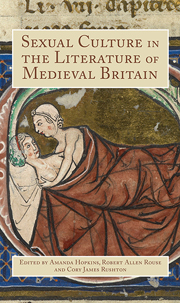Book contents
- Frontmatter
- Contents
- Introduction A Light Thrown upon Darkness: Writing about Medieval British Sexuality
- 1 ‘Open manslaughter and bold bawdry’: Male Sexuality as a Cause of Disruption in Malory's Morte Darthur
- 2 Erotic (Subject) Positions in Chaucer's Merchant's Tale
- 3 Enter the Bedroom: Managing Space for the Erotic in Middle English Romance
- 4 ‘Naked as a nedyll’: The Eroticism of Malory's Elaine
- 5 ‘How love and I togedre met’: Gower, Amans and the Lessons of Venus in the Confessio Amantis
- 6 ‘Bogeysliche as a boye’: Performing Sexuality in William of Palerne
- 7 Fairy Lovers: Sexuality, Order and Narrative in Medieval Romance
- 8 Text as Stone: Desire, Sex, and the Figurative Hermaphrodite in the Ordinal and Compound of Alchemy
- 9 Animality, Sexuality and the Abject in Three of Dunbar's Satirical Poems
- 10 The Awful Passion of Pandarus
- 11 Invisible Woman: Rape as a Chivalric Necessity in Medieval Romance
- Notes on Contributors
- Index
9 - Animality, Sexuality and the Abject in Three of Dunbar's Satirical Poems
Published online by Cambridge University Press: 05 August 2014
- Frontmatter
- Contents
- Introduction A Light Thrown upon Darkness: Writing about Medieval British Sexuality
- 1 ‘Open manslaughter and bold bawdry’: Male Sexuality as a Cause of Disruption in Malory's Morte Darthur
- 2 Erotic (Subject) Positions in Chaucer's Merchant's Tale
- 3 Enter the Bedroom: Managing Space for the Erotic in Middle English Romance
- 4 ‘Naked as a nedyll’: The Eroticism of Malory's Elaine
- 5 ‘How love and I togedre met’: Gower, Amans and the Lessons of Venus in the Confessio Amantis
- 6 ‘Bogeysliche as a boye’: Performing Sexuality in William of Palerne
- 7 Fairy Lovers: Sexuality, Order and Narrative in Medieval Romance
- 8 Text as Stone: Desire, Sex, and the Figurative Hermaphrodite in the Ordinal and Compound of Alchemy
- 9 Animality, Sexuality and the Abject in Three of Dunbar's Satirical Poems
- 10 The Awful Passion of Pandarus
- 11 Invisible Woman: Rape as a Chivalric Necessity in Medieval Romance
- Notes on Contributors
- Index
Summary
In her seminal 1980 essay Pouvoirs de l'horreur, Julia Kristeva identifies ‘the abject’ as the human reaction to a breakdown in meaning caused by the loss of distinction between the subject and the object, the interior and the exterior, or the self and the Other. Her classic example of a site of abjection is that of the human corpse, which although a continuation of the dead person's corporeal presence also becomes simultaneously a marker of his or her spiritual absence, and thus must be rejected or repressed, causing the subjective experience of ‘horror’. Kristeva argues that human rationality necessarily involves a series of such repressions, and that the association of the human with the unrepressed thus becomes a site of potential tension. ‘The abject confronts us’, she suggests, ‘with those fragile states where man strays on the territories of animal’. This borderland between the acceptable and the unacceptable thus becomes the site of the carnivalesque, the comedic and the socially transgressive, as attested by post-medieval writers from Rabelais to Bakhtin and beyond.
In the first decade of the sixteenth century, the abject was also a major concern for the poet William Dunbar, writing at the court of King James IV. Dunbar's poems are critically regarded as some of the most brilliant – and, frequently, the most offensive – writings produced in late medieval/ early modern Scotland. Many of his satirical pieces depict the court of James (who would later go on to lose his life at the disastrous Battle of Flodden) at play, simultaneously parodying and affirming the excesses of late medieval/Renaissance aristocratic culture.
- Type
- Chapter
- Information
- Sexual Culture in the Literature of Medieval Britain , pp. 127 - 146Publisher: Boydell & BrewerPrint publication year: 2014



